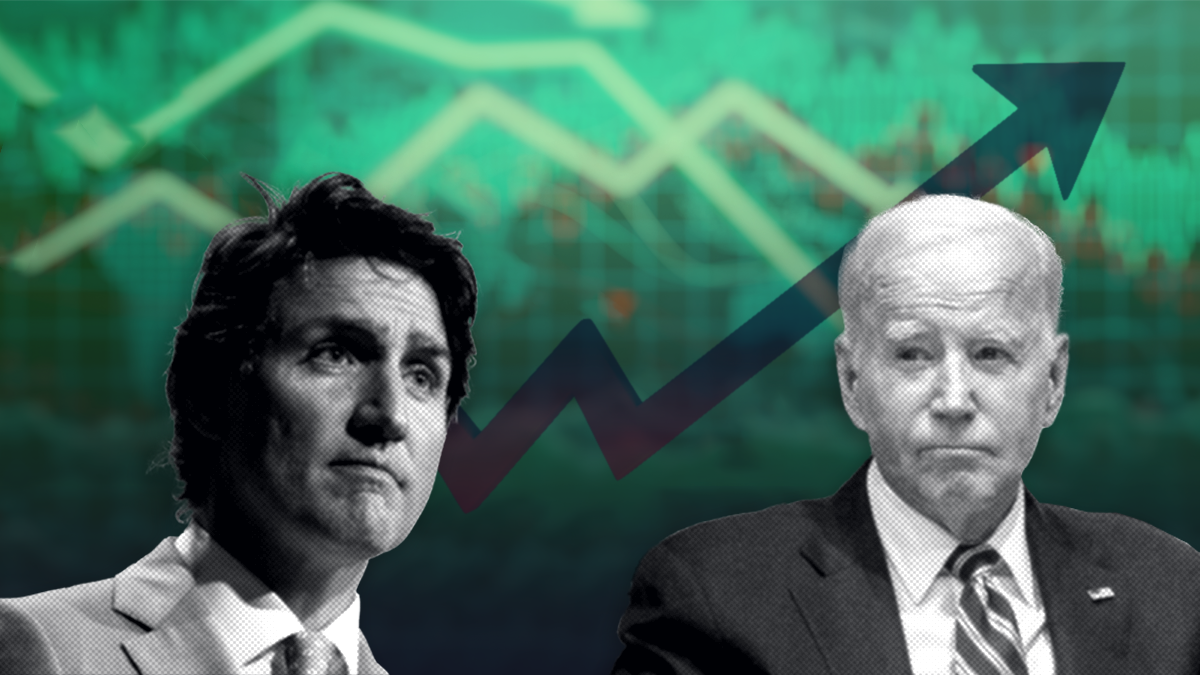Justin Trudeau got some good news on Tuesday: Statistics Canada released the Consumer Price Index for January, showing it was lower than expected – at only 2.9%, down from 3.4% in December.
The surprise slowdown in inflation raises hope that the Bank of Canada may be able to cut interest rates before long, perhaps soon enough to prevent a devastating cash crunch for homeowners with variable rate mortgages (three million of them could otherwise be in trouble).
That news should give Trudeau a boost, or at least that is how things are supposed to work. For decades, the conventional wisdom has been that governments suffer in the polls when money is tight and benefit when times are good. But pollsters are no longer seeing the same clear link between economics and politics, which raises doubts about whether good economic news can rescue the struggling governments of Trudeau and Joe Biden.
“On paper, both economically and legislatively, Joe Biden has been a very successful president,” says pollster Nik Nanos, of Nanos Research. “But the thing is that the polarization, the exceptional polarization that we're seeing in the United States, there's nothing that he can do.”
Voters remain unconvinced
US inflation numbers in January were slightly higher than expected, but other economic measures are between good and great. Consumer confidence has reached its highest level since December 2021, and GDP and employment numbers are strong. Still, only 33% of voters approve of Biden’s handling of the economy, and his approval rating is negative.
Republicans can’t be convinced that Biden’s economic policies are working. Researchers at Stanford University have found that Republicans are two and half times more partisan in their view of the economy than Democrats, meaning they think times are good when a Republican is in the Whitehouse and bad when the president is a Democrat. But the researchers’ models show that even partisan bias doesn’t explain all of the current negativity.
The result is a kind of “joyless prosperity,” says Nanos. “It’s basically 50 years of correlations between economic performance and incumbency that are being undermined. People increasingly can't tell the difference between what the truth is and what is false.”
Believing things that are not true
What’s new is social media, which amplifies negative messages and convinces people of things that aren’t true. Voters are entitled to be grumpy about cost-of-living increases, but many think things are much worse than they are.
Pollster Frank Graves, of Ekos Research Associates, finds it disquieting. “The people who were most upset with Trudeau, which is a big group, they think inflation is continuing to go up,” says Graves. “They think Canada is last in the G7 in terms of GDP. They think they’re going to be doing worse next year. But all the indicators suggest those things are not just only untrue, they’re grievously untrue.”
There are signs that in the United States, the economic news will eventually get good enough that it will be tough for even partisan voters to ignore, but Biden faces another big problem — many voters think he is too old. Trudeau doesn’t have that problem, but he is much farther behind in the polls than Biden. Both men are facing such stiff headwinds that commentators are urging their parties to dump them.
Time to change leaders?
But would Democrats and Liberals be better off with different leaders? Biden polls better than Democratic alternatives, so it’s hard to see how his party would benefit from replacing him.
In Canada, the situation is less clear. Pollster David Coletto, of Abacus Data, thinks the Liberals might be better off getting rid of Trudeau because he’s so unpopular. “He’s got to make people who don't want him back feel that the alternative is far worse. And in order to do that, people need to listen to you. And I just don't think people are listening to Justin Trudeau anymore.”
Both Chrystia Freeland and Mark Carneypoll better than Trudeau — a sign that he may have worn out his welcome with voters — but he has the support of his party, perhaps because of uncertainty about the alternatives and his track record as a formidable campaigner. And even with a new leader, Liberals would still face an electorate that thinks Canada is broken.
Ironically, Biden and Trudeau’s opponents are less popular than rivals within their parties. Polls show Nikki Haleywould destroy Biden, and Jean Charestpolled better than Pierre Poilievre.
Whatever commentators think, neither Biden nor Trudeau are likely to be forced out before the tough elections ahead. And even if they were to go, whoever replaces them would still face voters who won’t believe that the economy is getting better, no matter what the numbers say.






